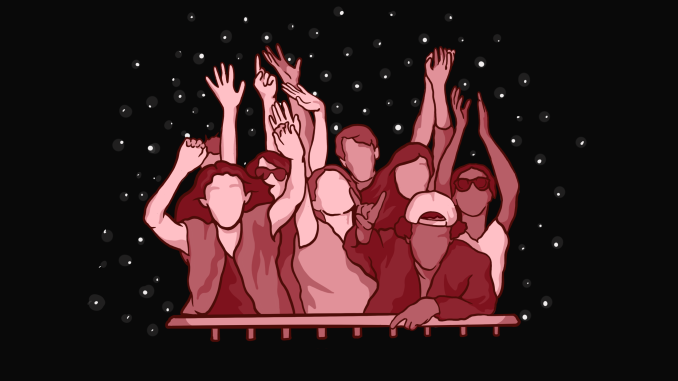
Attending a live concert is an exciting experience for any music lover who wants to see their favorite artists, sing along with the crowd and lose themselves in the moment. However, as exhilarating as a concert can be, it’s also a social experience that requires a level of etiquette.
Recently, people have noticed concert etiquette and safety worsening, with concertgoers being more rude, disrespectful and harmful to fellow audience members. In 2021, crowds rushed the stage at Astroworld Festival in Houston and people were crushed, ultimately resulting in dozens of hospitalizations and 10 deaths, The New York Times reported.
On Friday, rappers Lil Yachty and G Herbo will be performing at The Liacouras Center for Owlchella 2023, an annual concert hosted by Temple University’s Main Campus Program Board. It’s important students practice concert etiquette and are attentive to safety procedures at Owlchella to create the most enjoyable concert experience for everyone attending.
By respecting each other’s boundaries, paying attention to their surroundings and personal space and observing the venue’s rules and standards before attending the event, students can make the most of their concert experience while also contributing to an overall positive atmosphere.
In recent months, people on social media have begun to call out the problematic behaviors they’ve experienced at live shows.
Concerts have started to feel like hostile environments due to aggressive fan behavior, said Ella Jenkins, a sophomore graphic design major, who attended concerts featuring artists Goose and Masego this year.
“In the younger concerts, there’s definitely a lack of respect for people’s space and well-being,” Jenkins said. “I feel like fans to artists now get more aggressive about being in the front and not really quite sure if I’ve noticed anything too specific per group of music, but I think it’s just more younger people tend to be more aggressive towards the people around them.”
Recently, live shows have been treated like competitions, becoming a matter of who can get closest to the stage, or who can get noticed by the headliner with a sign that blocks everyone else’s view.
It becomes difficult to even enjoy live shows when others bring distracting items with them, said Madalyn Dingman, a sophomore film and media arts major, who attended concerts for groups like Wallows and The Band CAMINO in 2022.
“You pay all of this money, you wait all of this time, and it’s like ‘Oh man, I can’t even see the lead singer because some girl has a huge cowboy hat,’” Dingman said.
Concertgoers spend money to attend shows; Owlchella costs $25 for students, excluding service fees. Students should get their money’s worth, and it’s unfair for paying attendees to be met with an uncomfortable and potentially unsafe environment.
Students should also remain vigilant in case there are panicked situations at the upcoming Owlchella or any other concert.
At a Lil Durk concert held at the Liacouras Center in February, attendees stampeded toward exits after reportedly hearing gunshots, NBC10 reported. After investigating, police found the sounds were not from a gun, but the incident caused panic and resulted in many concertgoers fearing for their lives.
Similarly, a crowd surge can occur when there are too many people in one space being pushed aggressively to the front, causing some to fall, be trampled, or be squeezed so tightly they can’t breathe.
The risks of hazardous situations at live shows can be mitigated or possibly even prevented if people are more conscious of how their behavior impacts those around them. For instance, avoiding pushing to the front can help prevent disastrous events, like the Astroworld tragedy. Additionally, being familiar with the layouts of the venue can create safer experiences because you’re more likely to know how to respond to an emergency.
With Owlchella set for this week, students should know where the nearest exit is, where medical personnel are in the venue, and where the bathroom is in the event someone gets sick, said Christine Cleaver, a tourism and hospitality management professor.
“You need to be very aware of your surroundings, and you have to be very well aware of your limits and kind of behaviors,” Cleaver said. “Just to kind of be on your toes.”
When people remain vigilant of their environment, concertgoers will most likely be more prepared to react in the event of an emergency.
Concerts are meant to bring those who love the same artists together and create a sense of community. Practicing concert etiquette and safety precautions contributes to a fun, welcoming and safe environment where all fans can indulge in the thrilling experience of hearing their favorite music live.


Be the first to comment